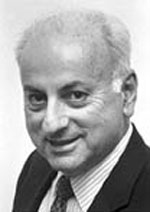|
|
 |
 |
|
OBITUARIESMelvin Schwartz ’53, Nobel Prize Winner in Physics
Melvin Schwartz ’53, who in 1988 won the Nobel Prize in Physics with his Columbia colleagues Jack Steinberger and Leon Lederman ’51 GSAS, died from complications of Parkinson’s disease and hepatitis C on August 28, 2006, at a nursing home in Idaho. He was 73 and lived in Idaho since 1997. According to The New York Times, “The Nobel-winning experiment, conducted in the early 1960s at Brookhaven National Laboratory on Long Island, provided physicists with a new way to study one of the universe’s fundamental forces: the weak interaction, which governs how atomic nuclei fall apart in certain types of radioČactive decay. It also showed for the first time that two types of neutrinos existed. Other researchers later discovered a third. “The experiment slammed high-energy protons into a piece of beryllium. The collisions tore apart the beryllium nuclei, generating evanescent particles that fell apart in a cascade of debris. “Part of the debris included particles that always came out in pairs, a muon - a heavy version of an electron - together with a neutrino. A 40-foot-thick wall of steel, made from old warship armor plate, filtered out the atomic debris, except for the ghostly neutrinos, which continued traveling in the same direction as the initial beam of protons. “The scientists could then study the occasional collisions between neutrinos in the beam and aluminum atoms in a 10-ton detector. Those collisions showed that the neutrinos produced in conjunction with muons were different from those produced in conjunction with electrons.” Born in New York City on November 2, 1932, Schwartz attended the Bronx H.S. of Science before attending the College to study physics. After receiving his B.A., he stayed at Columbia to pursue graduate studies and in 1958 earned a Ph.D. in physics from GSAS. In 1991, he was awarded an honorary Sc.D. by the University. Schwartz was research scientist at Brookhaven from 1956-58. In 1958, he became an assistant professor at Columbia, in 1960 an associate professor and in 1963 a full professor. Three years later, Schwartz left Columbia to become a physics professor at Stanford. While California, in 1970, he founded Digital Pathways, a company that made equipment that allowed people to log onto computer networks securely from outside locations, and was its president and CEO. In 1983, Schwartz left Stanford to work full-time at Digital Pathways, but in 1991 was persuaded to return to physics by Nicholas Samios ’53, ’57 GSAS, who was then director of Brookhaven. Of Schwartz, Samios was quoted in The New York Times as saying: “He was an original thinker . Previously, people were just doing decays of particles. He said, 'Why don’t we just reverse it?’ That was one of his great ideas.” Returning to New York, Schwartz became associate director of high energy and nuclear physics at Brookhaven, where he oversaw the building of four detectors at the Relativistic Heavy Ion Collider, known as RHIC and currently running at Brookhaven. He also returned to teaching at Columbia and in 1994 was appointed I.I. Rabi Professor of Physics. Active in College alumni affairs, Schwartz served on the College Board of Visitors from 1989-92, on the College Alumni Association Board of Directors from 1991-94 and funded the Alumni Host program. He was honored with a John Jay Award for professional achievement in 1989 and the Alexander Hamilton Medal in 1995. Schwartz retired in 2000 and was a member of the National Academy of Sciences and a fellow of the American Physical Society. His wife, the former Marilyn Fenster, survives him, as do his children, David, Betty Marcon and Diana Bodell; brother, Bernard; and six grandchildren. Lisa Palladino
|
|
||||||||||||||||||||||||||||




